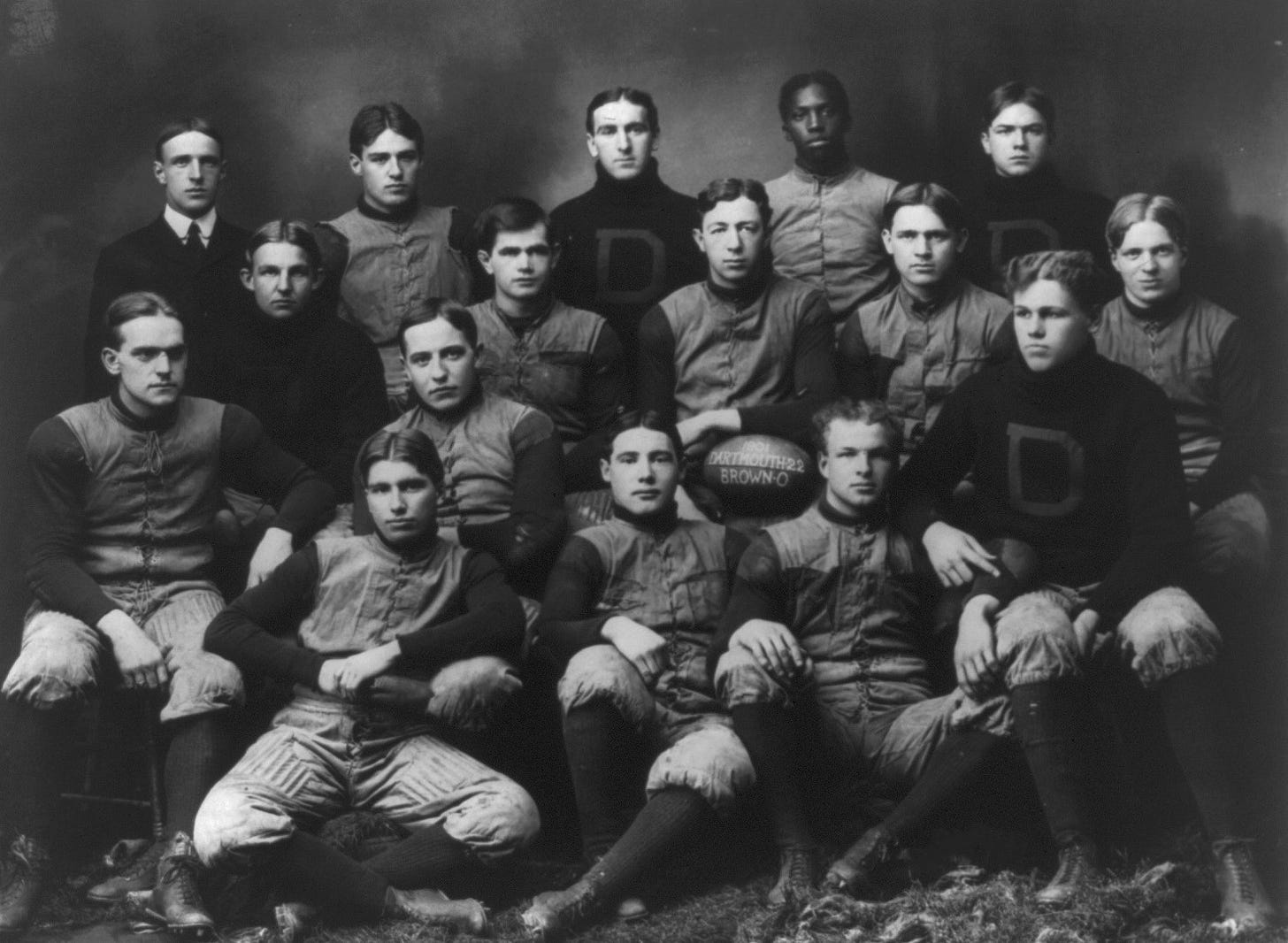Coach Frank W. Cavanaugh
Francis William Cavanaugh was an American football coach of the old school. He was born in Worcester, Massachusetts on April 28th, 1876, to Patrick Cavanaugh and Ann O’Brien Cavanaugh, both Irish immigrants. A star football player in high school, Cavanaugh later attended Dartmouth where he continued to excel at the game. In 1898 Cavanaugh left Dartmouth to accept a job at the University of Cincinnati, the first in a series of increasingly successful coaching positions he would hold until his untimely death in 1933.
Cavanaugh’s life and career were depicted in the 1943 Hollywood film, “The Iron Major,” starring the popular 20th century Irish-American actor Pat O’Brien in the title role. Coach Frank W. Cavanaugh was inducted into the College Football Hall of Fame in 1954.
The Finishing Touches
One of the most effective methods of finishing off and polishing a team’s offense for its final game is shadow scrimmage. The coach should stand in front of his regular team, and behind the second team’s line, raising his hands above his head to signify plays. The varsity team should go through its entire repertoire of plays at a slow trot. There should be no tackling, and only a mild resistance by the second team. Every first-string player, however, should execute his assignment on every play in the form he has decided to adopt.
The object of this drill is to make certain that a team has not become careless in the small but ever important details; to preserve that last factor that makes ground-gaining certain: thoroughness.
Shadow defense, moreover, gives players a chance to consider carefully the particular appearance of the opposing backfield in the various plays as they approach the line. It raises in the players’ minds many useful ideas as to the precise manner in which certain plays may best be stopped or advanced. Thus the player acquires the valuable habit and experience of thinking about these things as the plays come to them in harmless form.
The rope is a physical drill which aids enormously in putting the finishing touches on a team when it is not wise to order very much scrimmage. Those ten-yard charges under the taut-held rope — five yards to the line and five beyond, turn again and go — are tremendous builders of muscles and endurance. There is no telling how much rope drill a team in condition can stand, but the wisest rule is to stop the exercise when you see the good men slowing down. Remember that the shorter men have an advantage in this drill if charging side by side with taller fellows. Therefore the men should be assigned to groups according to height. Even then it will always be noticeable that the tall men are the first to weaken under the strain.
Even if a coach intends to hold out certain players for supreme moments, he ought to start the game with his strength. Never give the other team an initial impression of weakness! The coach who holds out important men at any time is taking a gamble. I will admit that I have taken risks of this kind myself occasionally; but very seldom, and only after a careful calculation of the chances.
For instance, in one game, played under almost impossible conditions of snow, rain, hail and deep mud especially, I held out four of my best men for the entire third period, and sent them back, after nearly three-quarters of an hour of rest, warm and dry, in fresh uniforms and shoes. I believe that they saved my team from defeat; but I had gambled, all the same, that there would be no scoring in the third period.
In this game the conditions were exceedingly poor for any kind of football, but especially for forward passing or kicking. A kick of twenty-five yards beyond scrimmage was a fine punt. Both teams gave up attempting to catch the ball, which seldom would roll five yards. Often it would bury its nose in the mud and spin. This was a very exceptional game.
Usually the regular men are so much better than the subs that one should play them all the way. At the same time, a coach should never hesitate to put in a good substitute for a regular man who is not going well. One of the hardest lessons coaches and trainers must learn is to take any injured man out; especially if that man is a star. Yet the good substitute, uninjured and fresh, is the better man of the two.
Frequently the source of amazement to the coach and rejuvenation to the team is the substitute, especially the back; but this only because his work is more noticeable than a line player’s. He comes into the game strong and determined, eagerly embracing the golden opportunity. Many a defeat has he turned into victory. It took me a long time to become convinced of this, even after I had seen it done; but to the young coach who has yet to make up his mind I offer prayerfully this motto: “Do it now.”
I must admit I am not in favor of singing or instrumental music for football players on the day of a big game. And if the student bands outside must play, I would prefer that they confine themselves to martial airs. The making of music, or listening to it, does not create a warlike attitude. Calm, quiet, dispassionate discourse, or walking, is a better way to pass the tense hours before a big match, which real football players should regard at least with a certain degree of seriousness.
The mass-meeting is one of the most wonderful institutions of college life. It gives a thrill which many a man will be able to recall until his dying day. This should not, however, be coarsened or cheapened by too frequent repetition. One uproarious mass-meeting will do as much as anything or anybody can to put the finishing touches on a team. Do not have too many of them. Save their glorious inspiration for the supreme occasion.
The best kind of a speech before a big football game is the one which contains not too many specific reminders, which might give the players a feeling that they are still unprepared. They ought to feel that at least they know as much football as their opponents, and probably more; that the game resolves itself to a proposition of extreme individual effort and team play. The final exhortation should arouse the team to intense feelings of brotherhood, fealty and self-sacrifice. Within due limitations of decency and fair play, build a supreme determination to win. For while there may be honor and glory in defeat, it is not to court those glories and honors that a team goes forth to battle.
Between the halves, as at all other times, the coach must remember that the men are human. They will stand for abuse if necessary; but you should show them first that the abuse is justified.
Try to remember that their spirit of elation or depression rivals your own. Therefore, for the best interests of all concerned, see that the men are as comfortable as possible, and that all necessary things in the way of physical repair are undertaken immediately and silently. Remember that the men are watching astutely every move of the coach, whom they consider, after all, their main reliance in adversity. His first duty is to correct, as dispassionately as circumstances will permit, the errors of play, of commission and of omission. His second duty is to improve both offense and defense if possible. He must avoid generalities at this time. He must be specific. Above all things, if he expects a response from his men, he must be logical. If he does not know what to say, silence is far better than hit-or-miss fault-finding. He is, in the minds of his men, superior to them in judgment; and he must live up to his role. If the team is carrying out his teachings as well as it can, if it is simply outplayed by a superior antagonist, he must be fair. He must never let the team catch him off his balance, and thus give the impression that he is at a loss how to improve the situation. If the coach is at his wit’s end, it is far better judgment to take no chances by way of random suggestions. Rather he should evolve some scheme by which to hide his perplexity. He might, for instance, take in turn three or four of his more reliable men, off at one side but in plain view of the rest of the team, and hold secret conversation with them, urging that they pull the team together by their own physical and mental power; anything to make it appear to the team that the coach is not at the end of his tether, and that there is still hope. Having in some manner created the impression that help is at hand, and that better results must come, the coach should make his appeal, putting all his power of thought and feeling into the final words. If he is a real coach his team will go forth to the second half rejuvenated, encouraged and determined.
Order Full Text
We hope you have enjoyed this excerpt from Inside Football by Frank W. Cavanaugh, published in 2023 by Ether Editions. Inside Football is available from Major Online Retailers.







